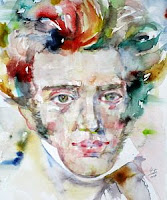Reading Kierkegaard’s Spiritual Writings in Kashmir

The noble souls who are dismayed by seeing how evil or untruth seemingly flourishes in the world, Kierkegaard thus consoles: “In this world, Truth walks in meekness and humiliation. It does not have a place to lay its head, and it must be thankful if one will give it a cup of water.” It has been a singular misfortune of modern Kashmiris that they have been nurtured on philosophy and culture deficient diet contributing to manifold ills besides criminal betrayal of our cultural heritage. Although our institutions and scholars had given us translations of some important literary texts, we have, largely nothing to show when it comes to philosophy for which Kashmir had been originally famous. Major modern figures in philosophy have been virtually unknown for Urdu and Kashmiri speaking people in our State as no institution/scholar had dared to translate even secondary or introductory texts. Now, it is indeed a news (that Saifi family divulged recently) that we shall soon be greeted wi


